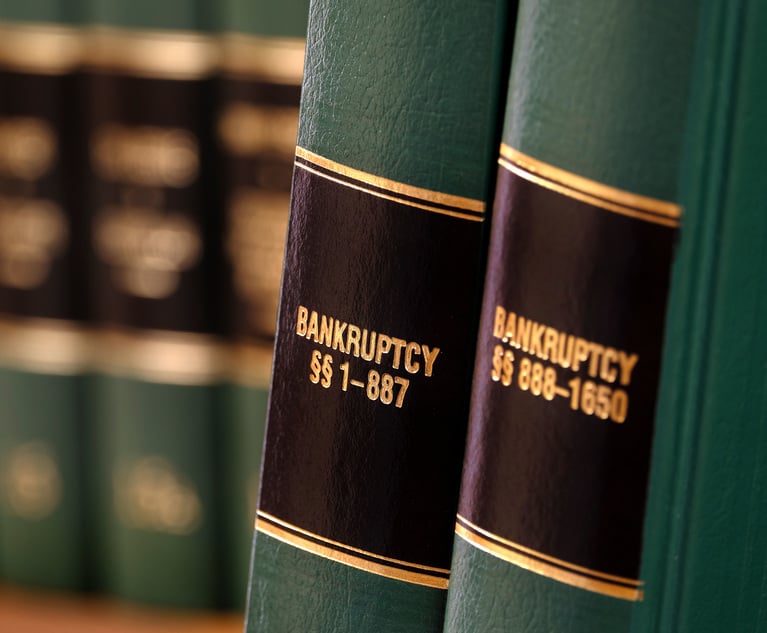 Georgia Supreme Court and Court of Appeals Building. (Photo: John Disney/ALM)
Georgia Supreme Court and Court of Appeals Building. (Photo: John Disney/ALM)A tort reform group has determined that the Supreme Court of Georgia—despite being dominated by appointees of Republican governors—is so friendly to plaintiffs that the court is close to joining the group's annual “judicial hellhole” list.
The American Tort Reform Association put the Georgia high court on its “watch list” for the second consecutive year.
The group's top complaint was that the court upheld a $40 million verdict against Chrysler in a case about a young boy who died in a fire after a Jeep accident. The plaintiffs claimed the fire resulted from the company placing the gas tank behind the vehicle's axle, while the company said the driver of the car that rammed into the Jeep was to blame.
The group criticized the court for allowing the plaintiffs to tell the jury about the Chrysler CEO's compensation, which the group said inflamed the jury. “The court allowed the introduction of this evidence, even after acknowledging that juries may use the evidence to 'express biases against big businesses.' As discussed in ATRA's amicus brief, this decision is likely to encourage further efforts to enflame juries with this kind of unnecessary, distracting evidence.”
The group pointed to two other high court decisions, and its giving an amicus curiae award to plaintiffs lawyer Joel Wooten, to justify its criticism of the Georgia high court.
In one decision the court held that a medical malpractice plaintiff's discovery that nursing staff may have violated hospital rules meant that a new claim could be added to the lawsuit, even though the statute of limitations had run.
In the other case, the court cleared the way for a negligence case against a caterer, with Justice Michael Boggs writing for the unanimous court, there has been a “mistaken impression that food poisoning cases 'are a unique species of negligence cases' imposing a heavier burden upon the plaintiff to show proximate cause than that generally required.”
The group concluded that “liability expanding decisions by the Georgia Supreme Court are becoming the norm.”
Seven of the high court's nine members were appointed by Republican governors. One of those governors, Gov. Sonny Perdue, championed a sweeping tort reform legislation, although the Georgia courts struck down parts of it.
The state Supreme Court declined to comment on the group's report, a spokeswoman said.
Laurie W. Speed, the president of the Georgia Trial Lawyers Association, told the Daily Report that the tort reform group's report ”is nothing more than a self-serving propaganda sham that is strategically released only weeks before most state legislatures, including Georgia's, start their legislative sessions.”
“The report is yet another reminder of how corporations use front groups to undermine the civil justice system and try to deflect from their own failings,” Speed added.
Speed noted that “under the leadership of Governor Nathan Deal, and under the watchful eye of a very conservative Georgia Supreme Court, the State of Georgia has for eight consecutive years created a thriving business and legal environment.”
“It is simply impossible for one state to be home to both the #1 business and legal environment in the country and a Supreme Court that is on the verge of being ranked as a judicial hellhole,” she concluded.
California, Florida Top the List
On a national level, California and Florida topped the “hellhole” list.
California's top ranking comes after the state's highest court became the first in the nation to hold manufacturers of brand-name pharmaceuticals liable in cases involving their generic equivalents.
“That was such an outlier,” said Sherman “Tiger” Joyce, ATRA's president. “There was a sense that what was going on in California collectively was enough to rule it beyond Florida, and there was not the level of negative activity in Florida.”
New York City's courts jumped to No. 3, while the Philadelphia Court of Common Pleas and New Jersey's legislature, though not its courts, also made the list.
Some overriding concerns in the report involved: the prevalence of “junk science” at trials; class actions, particularly involving food packaging, which the defense bar insists have no injuries; and “activist” attorneys general who have brought cases over opioids and climate change.
Peter Knudsen, a spokesman for the American Association for Justice, the nation's largest plaintiffs bar, said of the report: “ATRA's definition of a 'hellhole' is a courtroom where a plaintiff brings a case in front of a jury to hold an unscrupulous corporation accountable. The real hellhole is a world in which an unsuspecting consumer is harmed, abused or defrauded by an unscrupulous corporation but has no recourse and no chance to prevent future wrongdoing.”
California has been No. 1 in prior years, often cited for its unique laws, like this year's data privacy statute. But the California Supreme Court's Dec. 21 decision last year in T.H. v. Novartis Pharmaceuticals propelled it to the top of the list again. The ruling was the first to impose liability on brand-name drugmakers for the actions of generic pharmaceutical manufacturers, which the U.S. Supreme Court found in 2011 were protected from tort actions by federal pre-emption under Pliva v. Mensing.
At least 35 other state and federal courts have rejected the theory, the report says, but since the California ruling, the Massachusetts Supreme Court has adopted innovatory liability.
“The reason the decision matters is for the first time consumers of generic drugs have a remedy when they're injured by a mislabeled drug,” said Leslie Brueckner, senior attorney at Public Justice who represented the plaintiff. “That's what this decision did. And because 90 percent of the drugs in America that are consumed are generic, it's a huge deal in holding the pharmaceutical industry liable for dangerously labeled drugs.”
Florida continued to rank high after the state's highest court refused to adopt the more defense-friendly standard for expert evidence, named for the U.S. Supreme Court's 1993 decision in Daubert v. Merrell Dow Pharmaceuticals, in its DeLisle v. Crane decision this year. But the report said the Florida Supreme Court was “poised to significantly shift” given that incoming Gov. Ron DeSantis, a Republican, would appoint three members of the court.
The report also expanded its ranking of New York City's Asbestos Litigation court to include all courts in New York City. That's primarily because of a growth in class actions brought over food packaging, Joyce said.
Like years past, the report chastised the Complex Litigation Center in the Philadelphia Court of Common Pleas, ranked No. 6, down one spot from last year, largely because of its pharmaceutical verdicts. And it called Pennsylvania's courts among those to watch because of their acceptance of out-of-state plaintiffs.
New Jersey, ranked No. 6 last year, received mixed reviews this year, with the report claiming it has the “most plaintiff-friendly legislature in the country.”
“For the first time ever, we highlighted not a state for its courts but for its legislature,” Joyce said. “But when you look at the totality of what the New Jersey legislature has done and is poised to do, it's dramatically expanding liability.”
In contrast, the report praised decisions of the New Jersey Supreme Court, such as its ruling enacting the Daubert standard.
Here are a few more highlights from “Judicial Hellholes” report:
- The Twin Cities area of Minnesota joined the list for the first time, at No. 9, because of an $850 million settlement in a groundwater contamination case. The settlement, between Minnesota Attorney General Lori Swanson and against 3M, gave $125 million in contingency fees to outside law firms. The Minnesota Supreme Court also rejected the Daubert standard.
- St. Louis continued to be on the list, at No. 4, down one ranking from last year, due to the legislature's failure to enact tort reform. The report also noted a $4.7 billion verdict against Johnson & Johnson over its baby powder.
- The Delaware Supreme Court got a “dishonorable mention” for its “take-home” asbestos ruling, and Texas trial courts for their large verdicts, such as a $706.2 million trade secret verdict against a Quicken Loans affiliate.
- The report gave kudos—called “Points of Light”—to the U.S. Supreme Court for its decision this year upholding class action waivers in employment contracts, and to the U.S. Court of Appeals for the Fifth Circuit for its reversal of a $502 million verdict over hip implants.
This content has been archived. It is available through our partners, LexisNexis® and Bloomberg Law.
To view this content, please continue to their sites.
Not a Lexis Subscriber?
Subscribe Now
Not a Bloomberg Law Subscriber?
Subscribe Now
NOT FOR REPRINT
© 2024 ALM Global, LLC, All Rights Reserved. Request academic re-use from www.copyright.com. All other uses, submit a request to [email protected]. For more information visit Asset & Logo Licensing.
You Might Like
View All
Bankruptcy Filings Surged in First Half of 2024 Amid Uptick in Big Chapter 11 Cases
3 minute read

Last Chance: The Daily Report's Managing Partner Survey Closes Soon

Mothers Still Face Disproportionate Burden in Legal Field, ABA Report Finds
6 minute readTrending Stories
- 1The Law Firm Disrupted: Playing the Talent Game to Win
- 2A&O Shearman Adopts 3-Level Lockstep Pay Model Amid Shift to All-Equity Partnership
- 3Preparing Your Law Firm for 2025: Smart Ways to Embrace AI & Other Technologies
- 4BD Settles Thousands of Bard Hernia Mesh Lawsuits
- 5A RICO Surge Is Underway: Here's How the Allstate Push Might Play Out
Featured Firms
Law Offices of Gary Martin Hays & Associates, P.C.
(470) 294-1674
Law Offices of Mark E. Salomone
(857) 444-6468
Smith & Hassler
(713) 739-1250







